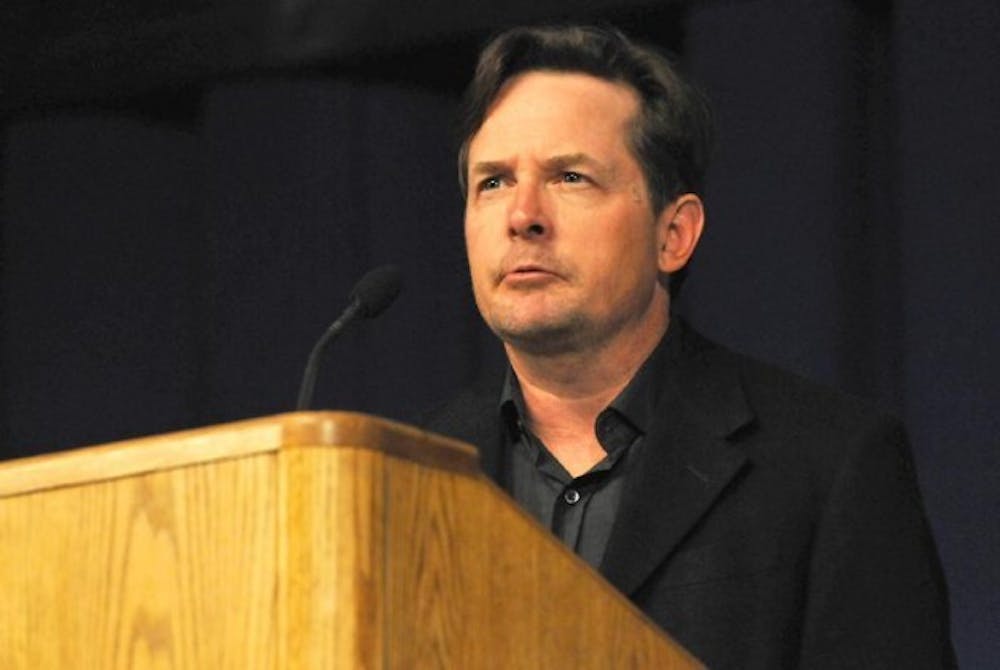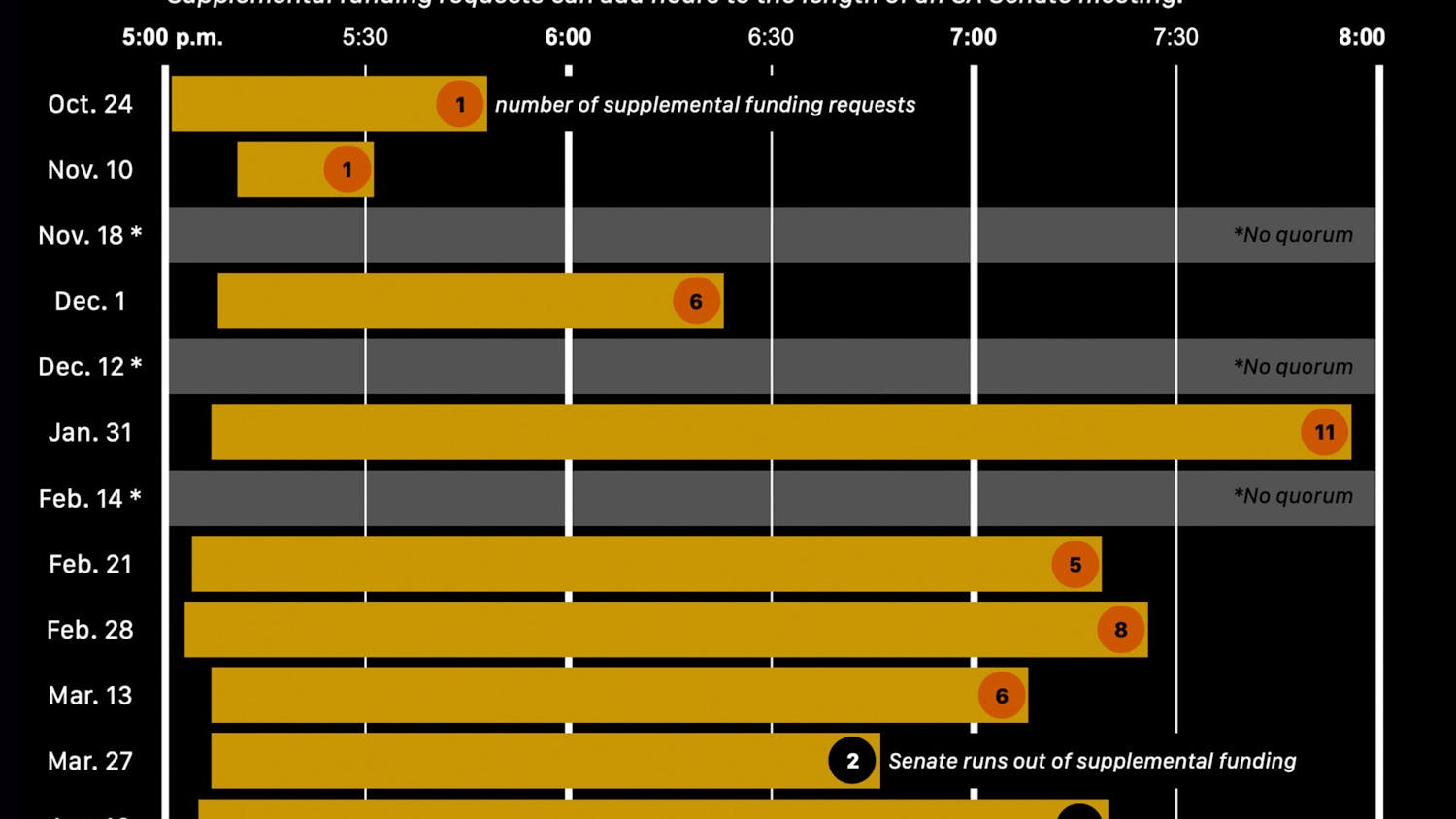Michael J. Fox woke up thinking he only had a little bit of a hangover after a night of drinking with Woody Harrelson. His hand was weak and his pinky finger was vibrating out of control. "No worries," he thought; it was only a side effect of the fistfight he got into the night before.
Fox, who is often regarded as the face of Parkinson's disease, was the second speaker in the 2011-12 UB Distinguished Speaker Series. He spoke to a crowd of nearly 5,000 people Wednesday night in Alumni Arena.
"I was filming Doc Hollywood when I first got the message," Fox told the crowd. "I woke up to find it in my hand. It was not a fax, telegram, or memo. My hand held nothing at all. It was trembling [in my pinky] and that was the message."
At first this trembling was only a curiosity, but quickly turned into a full-fledged panic, according to Fox. It was time to seek a professional's opinion.
Two decades ago, Fox was diagnosed with Parkinson's disease – a degenerative disease of the central nervous system more commonly known as the "shaking disease." He spoke to the UB community not only about the disease that changed his life forever, but also of the life experiences that shaped his worldview.
Described as a lecture that is an "episode of Oprah crossed with Charlie Sheen's Torpedo of Truth Tour," Fox tells his compelling story by joking and poking fun at himself. This puts the crowd at ease and allows Fox to get in a few laughs along the way.
Fox walked onto the stage in Alumni Arena to a standing ovation, supporting the blue and white by wearing a UB baseball hat. As the applause settled down, he took off the hat and proclaimed his moment of "shameless sucking up" to be over.
It's clear from the moment Fox began to speak – his Parkinson's is trying to win control with every word. He struggled to get out full sentences, and the trembling caused him to stutter and stumble over words.
Born into a military family in British Columbia, Canada, Fox didn't always know he was going to be an actor. He tried everything from hockey (at 5-feet-4-inches tall, Fox was too small to play professionally) to creative writing to playing in a band (a bust; making $100 a gig, but spending $250 on rented equipment was not evening out).
When Fox was 15, he took a drama class with Ross Jones – a man that he described as his "guiding force"; Jones set him up with an audition for Leo and Me, Fox's first big television break. Fox described Jones as a man who "took one step closer when you stumbled, but took one step back when you succeeded."
Fox was working on Leo and Me and another play in Vancouver, Canada, getting paid to act while still in high school. Ironically enough, he was failing his high school drama class and made the decision to drop out of school during his junior year to move to Hollywood and pursue acting professionally.
His career soared from there.
"Early success, money, [and] fame [is] like throwing Miracle Grow on your character defects," Fox said. "When everyone in the world suddenly says ‘yes' to you, some people respond by saying ‘yes' to everyone else."
He described this phenomenon as the "fun house"; he was on top of the world when his career took off from his stint in Family Ties.
People who Fox wanted to meet his whole life suddenly wanted to meet him instead. He even got the chance to play in a celebrity hockey game against his childhood hero, Bobby Orr, and was able to break away, deke, and score against the legend (he later learned Orr had let him score the goal).
"Fun house may sound great, but it can quickly turn into a carnival house of mirrors and warp your perspective," Fox said.
At the height of his career, Fox was diagnosed with Parkinson's. Doctors told him he had 10 good years of acting left – at 29 years old, Fox wasn't ready for the end.
"[It was like] a bomb went off," Fox said. "Did I ask, ‘Why me?' No. Did I say, ‘Why not me?' No. I think I said, ‘This is bulls***.'
"It was like being stuck in the middle of the road, unable to move and stuck in concrete. You know there is a bus coming and you don't know when or how fast it's travelling, but you know it's going to get there," Fox said.
From here, Fox started to take every job he was offered, blindly and without thought. He wanted to make his "last" 10 years count.
He starred in the Back to the Future trilogy, Spin City (a sitcom about a fictional local government running New York City), and Teen Wolf. He won an Emmy award, three Golden Globe awards, two Screen Actors Guild awards, GQ's "Man of the Year" award, a People's Choice award, and even has a star on the Hollywood Walk of Fame.
Fox came out publically with his diagnosis in 1998 – seven years later than his first doctor's visit.
"Disclosing my diagnosis to the public was the last step of owning up," Fox said. "I was no longer hiding it from myself and no longer hiding it from my family and close friends. One group of people supremely important to me, I was hiding it from. That was you.
"I didn't think [the audience] thought someone was funny if he knew he was sick," Fox said.
Fox married his Family Ties co-star, Tracy Pollan, and together they have four children – two sons and twin daughters. Tracy has been at his side throughout his illness, but Fox told the audience: don't call her his "rock."
"Parkinson's is always putting me in a box," Fox said. "Tracy is an expert at folding back the flaps, tipping it over, and easing me out. She's fluid, responsive, and wonderful."
These days, Fox is retired from acting, only making a few guest appearances on TV shows like Curb Your Enthusiasm, The Good Wife, Boston Legal, and Scrubs. He's a bestselling author of three books, most notably Always Looking Up: The Adventures of an Incurable Optimist – he shares his struggles and strides while living with Parkinson's.
In 2000, he launched The Michael J. Fox Foundation for Parkinson's Research in an effort to raise funds and awareness for the disease that changed his life in every way. The foundation has every resource needed to work toward its goals – everything except a department of cures, that is.
Dr. Jian Feng, UB professor of biophysics and physiology, is conducting research using stem cells to find the causes and cures for Parkinson's Disease right here at the university. His research is funded in part by the Michael J. Fox Foundation.
Fox remains hopeful for a cure to Parkinson's in the future and remains optimistic about the rest of his career, life, and the lives of other Parkinson's patients.
"Life comes down to a series of choices," Fox said. "The only choice not available to me is whether or not I have Parkinson's. Everything else is up for grabs."
Email: news@ubspectrum.com





